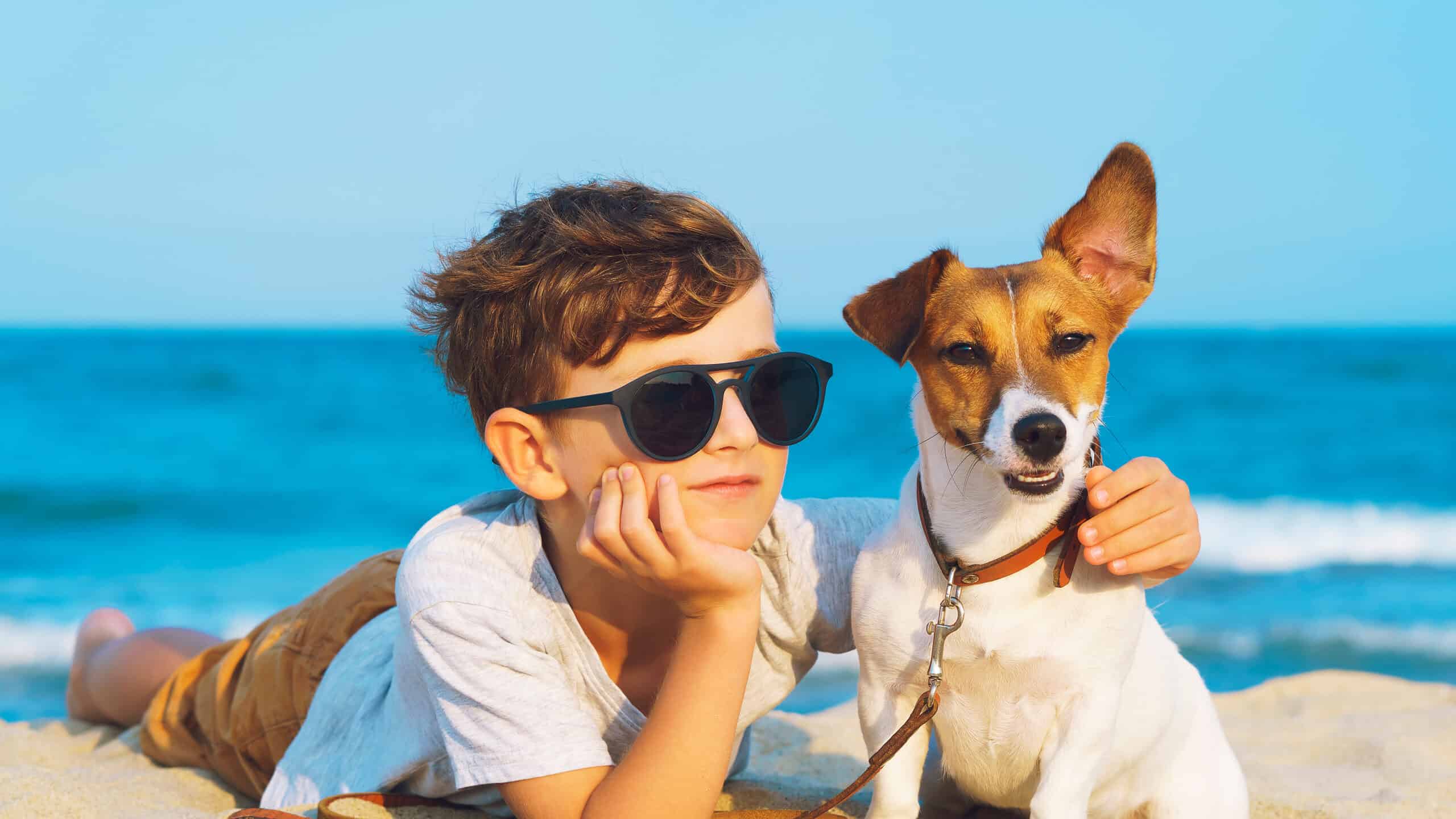You can already see it in your mind’s eye: your kid, snuggling on the couch with their new dog, both of them making contented sighs. Your child laughing excitedly as they throw your dog a tennis ball. You can almost see the dog coming back, ball in mouth, tail wagging, and then doing that adorable thing puppies do, where they refuse to let go of the ball once they've come back with it.
What kind of dog are you picturing? A big one or a small one? If you’re picturing a small dog, you may wonder, are small dogs good with kids? The answer is yes, and sometimes no. This depends on the breed of small dog, how the dog is trained and treated, and how well your kid and the dog “click.”
Advantages of Small Dogs
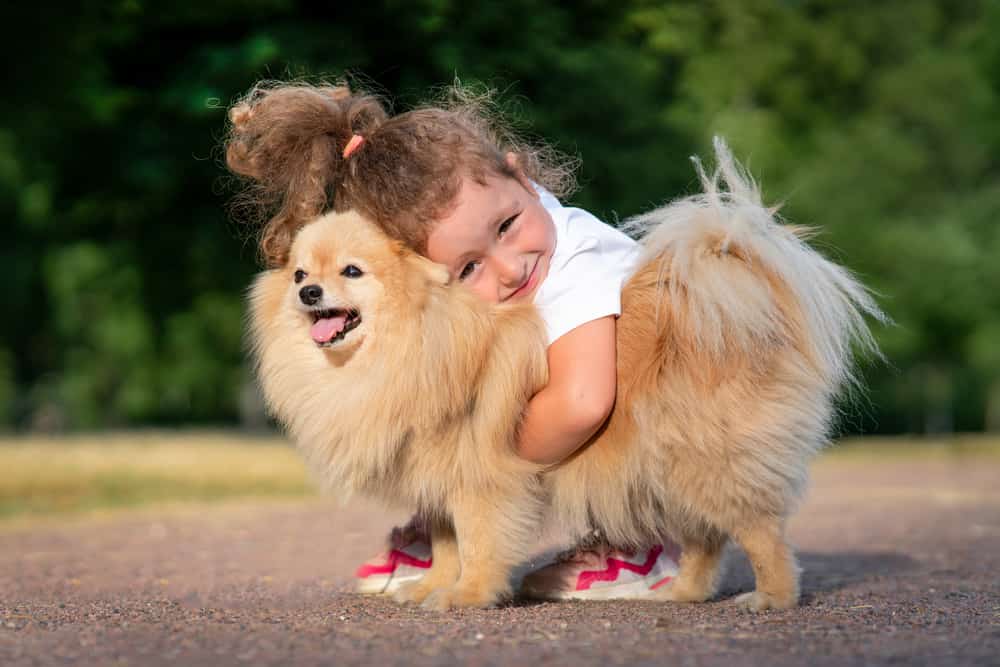
©EugeneEdge/Shutterstock.com
As you continue to envision your kid with a dog, some of the advantages of small dogs are pretty obvious. Picture your kid snuggling in their favorite armchair with a teacup poodle. Then picture them awkwardly fighting for space in the same armchair with a Great Dane.
Small dogs aren’t just easier to snuggle. They’re also easier to walk. And if you want to teach your child responsibility – a huge benefit of giving your kid a pet – you want them to be able to walk their dog safely. Simply put, walking a big dog can be dangerous for kids, while walking a small dog generally is not. A small dog won’t outweigh your young child or have the pulling power it takes to literally sweep kids off their feet.
There are other ways that small dogs won’t hurt or upset a child in a way a big dog carelessly might. If a miniature dachshund unexpectedly jumps up on or steps on a small child or toddler, it probably won’t be an upsetting experience. But if a larger dog does the same, it could be upsetting or even cause mild injury!
Littler dogs are also just generally easier to care for. Besides being easier to walk, they don’t need as much food, or as much space to run around. Other activities beyond walking are easier with small dogs as well. Because their small size gives you and your kid a clear physical upper hand, the littler breeds are generally easier to guide and control.
Considerations for Getting a Small Dog
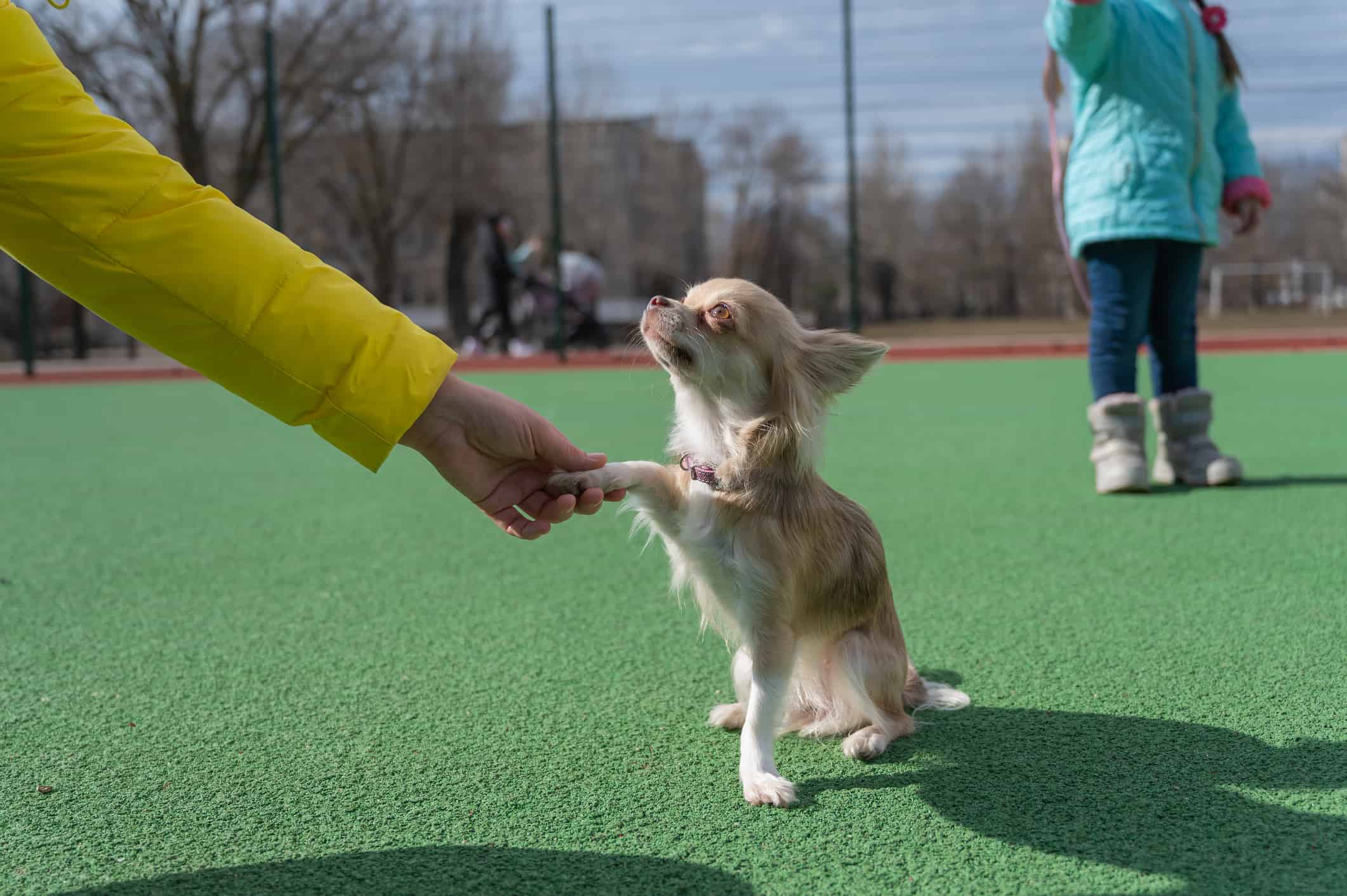
©iStock.com/Mikhail Dmitriev
While small dogs are easy to hold, play with, guide, and handle, there are some potential challenges to consider.
First and foremost, small dogs are fragile. While their tiny size makes them less likely to accidentally hurt your kid, it also makes your kid – or even you – more likely to hurt the dog. With smaller bones and lighter weight, tiny canines are exceptionally vulnerable if someone steps on their tail, carelessly pushes them, and so on. This is something you should be especially conscious of if your kids are young. The smallest children may simply not understand how to handle a smaller, more vulnerable pet with sufficient care.
You may have also heard that smaller breeds of dogs are more temperamental and aggressive. Is this true? There’s a lot of debate about this, but the general consensus is yes, small dogs are more likely to get upset and even lash out at humans. This consensus is even backed by scientific studies!
Now, some good news from those studies: three of the biggest reasons that small dogs are aggressive are the way the dogs are bred, the way they’re cared for, and the way they’re trained. Why is this good news? Well, all three of these factors are things you can control. You can choose a less aggressive small dog breed, and you can care for and train your tiny dog so that they feel calm and learn not to be aggressive.
In the next two sections of this article, we’ll look at breed selection, and then at care and training.
Are Small Dogs Good With Kids? It Can Depend on the Breed
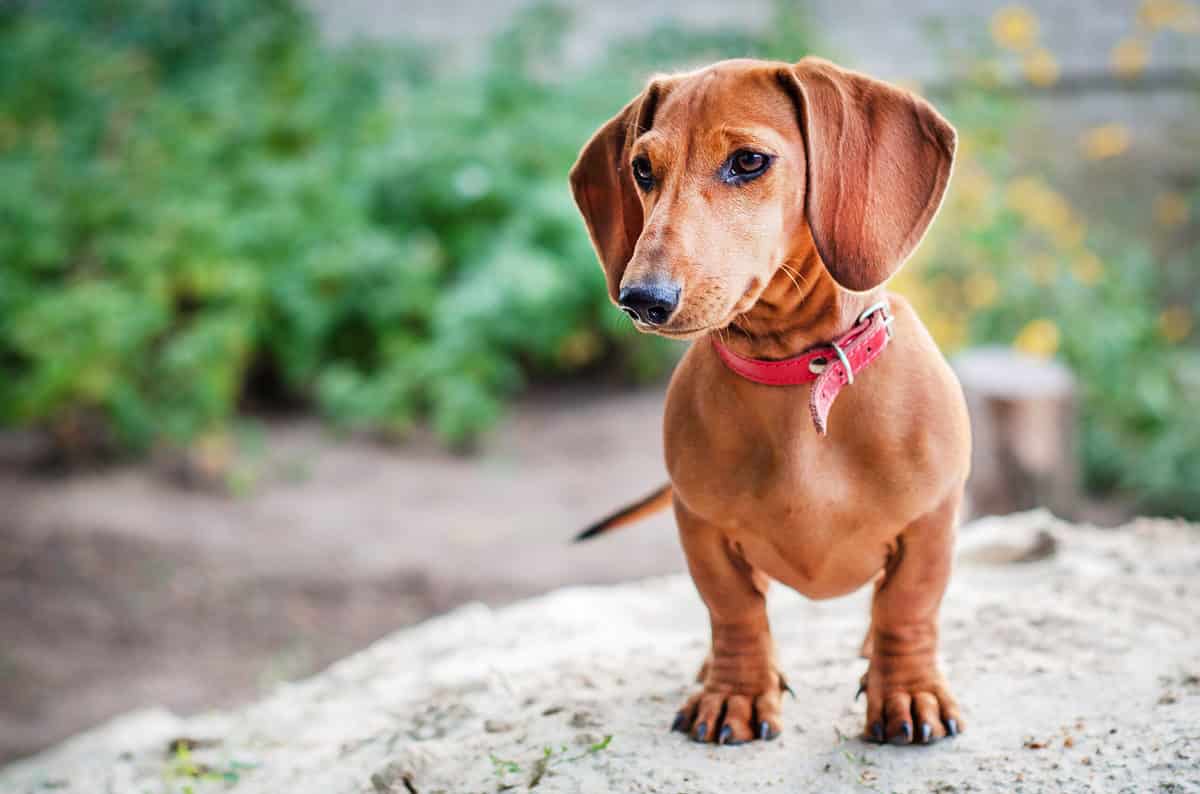
©Olexandr Andreiko/Shutterstock.com
More good news: there is a veritable rainbow of small dog breeds out there. With so many breeds to pick from, you can always find a petite pup with a good temperament. Yorkshire terriers are small and well-tempered, and as an added bonus for kids with allergies, they’re hypoallergenic. Pugs and poodles are known for being gentle too. These are just a few examples; there are many small breeds that don't have a reputation for being high-strung or aggressive. You can read Moms Who Think articles about specific small breeds and kids in our Dogs archive.
If you want to avoid reputedly aggressive small dog breeds entirely, lists of aggressive small dog breeds, such as this list from A-Z-Animals.com, can guide you. But ultimately, dogs – regardless of breed – are like people. Each individual dog has its own unique personality, and it’s distinctly possible that a dog from a breed known for rough temperament could still wind up becoming your kid’s new best friend.
How To Train and Treat Your Small Dog, so It’ll Be Good With Kids
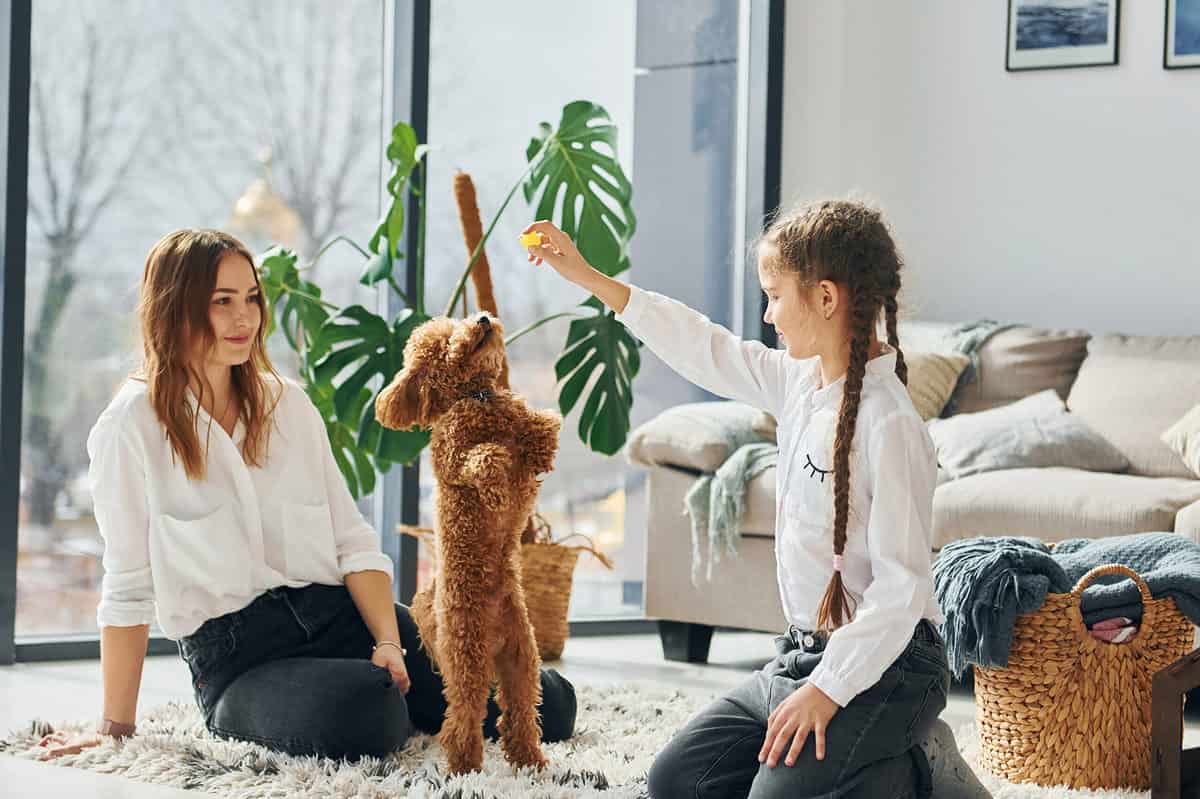
©Standret/Shutterstock.com
The American Kennel Club (AKC) notes that small dogs often receive inconsistent training from their owners. The owners may not give commands in the same way every time, or may not enforce rules very consistently. Because small dogs don’t seem very threatening, their training is often treated as unimportant. This is unfortunate, because training is important for all dogs, and is especially important if you want your small dog to be good with kids.
In that American Kennel Club article, the AKC also observes that pet owners are less likely to do activities together with their small dogs, such as fetch, family outings with the dog, and so on. If you take the time to do these sorts of things with your smaller dog, the dog will be less aggressive. And you and your kids will build some golden memories of time spent together with the dog, so it’s a win-win!
You also need to regulate your and your kid’s behavior toward the small dog. If you want your small dog to be good with your child, you and your child both need to be good to the dog. This means understanding that small dogs feel vulnerable due to their small size. You need to take extra care not to accidentally push or step on your petite pet. You also should make sure your kids – even the youngest ones – know not to play rough with the dog.
Look for a Good Kid-Dog Match
When asking the question, “Are small dogs good with kids?” what you’re really asking is, “Will the small dog I get be good with my kid?” Remember that just as both dogs and kids have their own unique, individual personalities, no two friendships between a dog and a kid are exactly alike.
So, how can you make sure you get a dog that will truly be your kid’s best friend and a welcome member of the family? The best way is to look for dogs that you can try on a trial basis and return if they don't seem to be working out. That way, if a dog doesn’t click with your kid or the family, you can give the dog a chance to match better with someone else. At the same time, your kid will get a chance to find the best possible dog, the pup of their dreams! This kind of trial is especially important if you’re considering a small dog since it really can be more temperamental and delicate.
Most dog adoption services allow tryouts where a small dog can audition as the family pet, and parents and kids can decide if they fit the role. Petfinder is a great service for locating an adoptable dog near you. Parents and kids also often have luck finding a great small dog when they visit their local humane association.
Are Small Dogs Good With Kids? Some Final Thoughts
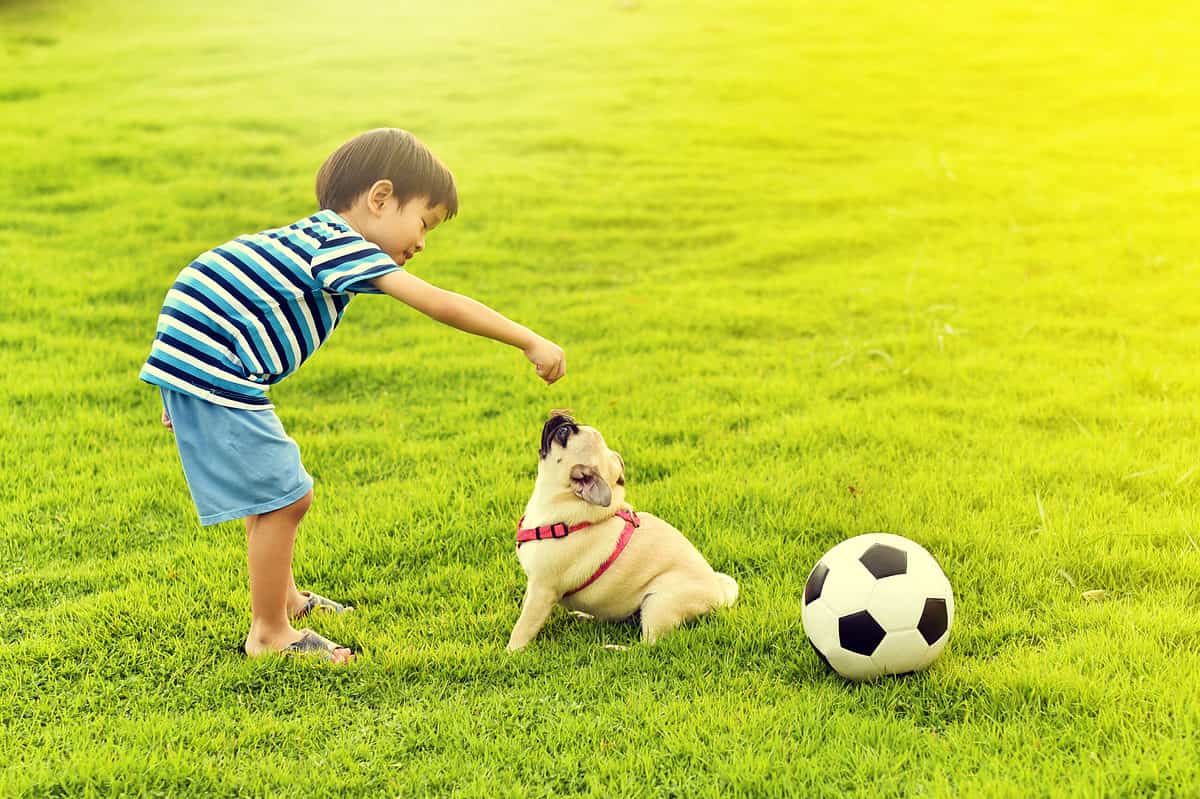
©Jarun Ontakrai/Shutterstock.com
In the comic strip PEANUTS, Charles Schulz created one of the world’s most beloved fictional dogs, Snoopy. Schulz celebrated the bond between the PEANUTS kids and their small dog (a beagle) by declaring, “Happiness is a warm puppy.” That's true, but it's also important to remember that owning a dog – especially a small one that needs special care and protection – can bring so much more than happiness to your kid.
Growing up with a dog helps kids develop empathy and responsibility. Dogs also afford kids special opportunities to bond with the whole family during shared time with the pet. And kids with dogs get special opportunities to exercise and spend time outdoors. The list of benefits dogs bring to kids goes on and on!
If your heart is set on a small dog for your kid, go out and find them their Snoopy. Your kid will thank you. The small dog you get will be grateful too.
The image featured at the top of this post is ©Larina Marina/Shutterstock.com.
